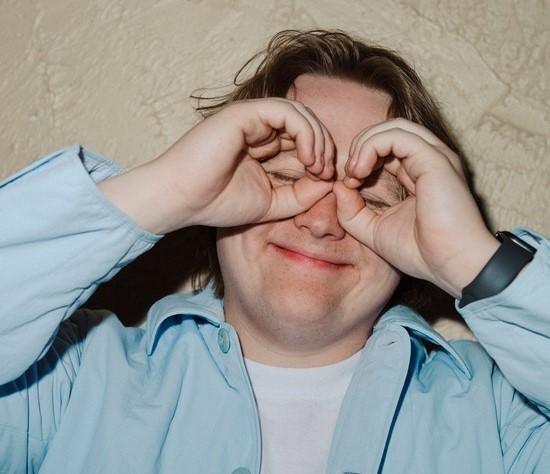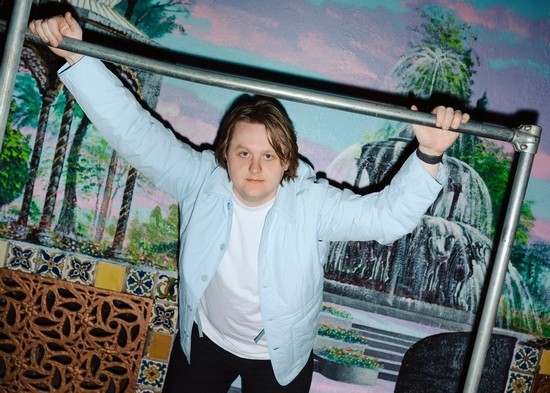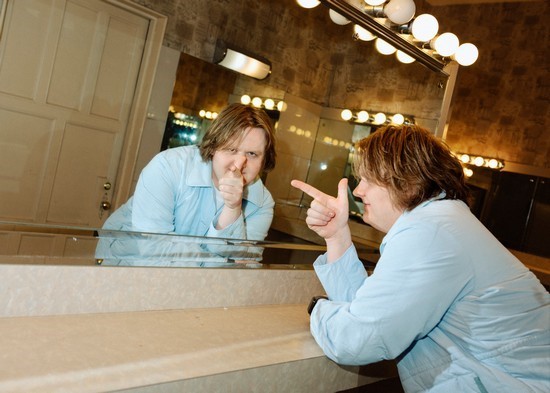The first thing you have to know about Lewis Capaldi is that
he is kidding. The Scottish musician, who specializes in pop treacle, is
foulmouthed the way a young child is — cheekily and cuddly, without a fleck of
harm. He is anti-piety, a bloke on a punchline bender. Almost everything he
says is accompanied by a wink.
اضافة اعلان
One Wednesday afternoon last month, Capaldi jumped out of a
chauffeured SUV in Times Square, joined by his manager and a handful of
associates. Up on a billboard — which one was not immediately clear — was an ad
for a documentary Capaldi had released on Netflix that day, and he was there to
film some shocked-and-awed promotional content for social media.
The first time the ad rotated in, Capaldi tried a couple of
photos pointing up at himself — eh, not so funny. By the third time, after
several interruptions from fans surprised to see the global superstar out and
about, he had figured out a mischievous plan.

He hit record and made a somewhat inappropriate joke, which
he shouted into his phone’s camera, while clips from the film played behind
him.
He seemed pleased. The next day, he posted the video to his
Instagram story, followed by footage of someone wheat-pasting posters over his
own ads. “My 15 minutes of fame are over,” he deadpanned.
Those minutes, though — they have been very, very intense.
In late 2018, Capaldi released “Someone You Loved,” a startlingly crisp and
uncommonly beautiful jolt of nuclear-grade mush. It is lightly schlocky in the
1980s way — ultra-saccharine, hyper-melodramatic — a diminishing resource in
the contemporary pop landscape. It has become the fourth most streamed song in
Spotify history, with 2.76 billion streams.
Just before his Times Square outing, Capaldi, 26, was
nursing a Sprite at an outdoor table at the classic New York City dive bar the
Ear Inn, musing over the weight of such a massive hit.
“Such an anomaly,” he said. “I hate saying this because it
makes me feel noxious almost. It’s becoming quite an evergreen song. I still
hear it as much as I did when I first put it out.” For those who feel that they
have been oppressed by the song, he understands: “You get to a point where
people might just be like, We don’t want to hear you whine again about
something. Can you do something that’s a bit less?”
Capaldi’s nominally less scarred second album, “Broken by
Desire to Be Heavenly Sent,” will be released this month. Not every track on
the album is a laser-targeted assault on the emotional stability of the
listener, but the best ones are. Whether he will be able to unmoor his adoring
public to the same degree he did last time remains to be seen.
Either way, Capaldi remains sanguine. “I went into releasing
‘Someone You Loved’ going, ‘This probably isn’t going to do that well.’ I’m
going into this going, ‘This probably isn’t going to do as well as “Someone You
Loved”’ — that’s a very big jump,” he said.
Capaldi has a scorched cannon of a voice, and it is best
deployed on songs about anguish. To date, his career has lurched forward one
vocal bloodletting at a time. His debut single, “Bruises,” in 2017, was viral
for that era. His debut album, “Divinely Uninspired to a Hellish Extent,” was
released in 2019 and featured “Someone You Loved” — which topped the Billboard
Hot 100 and was nominated for a song of the year Grammy — and also “Before You
Go,” another howling and deeply moving catalog of despair.
While all of this was happening, on the internet and in the
media, he was a relentless jester — hilariously self-deprecating on Instagram
and, later, TikTok. (“In the UK it’s like, ‘This (expletive) guy again,’”
Capaldi said of his musical success there, whereas in the US, “There are people
here who just know the TikTok.”)

Capaldi has had many small moments in which his comedic
persona has been as loud as his songs. At the Grammys in 2020, he had an Andy
Kaufmanesque face-off on the red carpet with an unsuspecting Ryan Seacrest.
“I was throwing a baseball at a brick wall, so there was no
recoil,” Capaldi said of the appealingly peculiar interaction, adding that he
had been enjoying the fruits of Grammy weekend partying. “It was like, oh, this
is so bizarre. But then in my head I’m like, this is even funnier.”
All the while, his health was precarious. Last year, he
announced that he had been given a diagnosis of Tourette syndrome — for
Capaldi, it manifests in physical tics that arrive at random and can be made
worse by stress. Sometimes, they happen when he is onstage — at one recent
concert, the crowd finished the songs that he could not. But the tics subside
when he is at ease: When fans came up to him outside the Ear Inn to chat, they
all but disappeared.
“This sounds gross, but it’s become part of like a marketing
strategy,” he said. “Every piece of content or thing I see with my name next to
it is closely followed by Tourette’s. Which is mental, ’cause then I’m like,
Billie Eilish has Tourette’s, and she doesn’t bang on about it like I do.”
He continued, “It feels dirty. It feels odd.” Then he added
with a laugh, “Whatever sells the records!”
Capaldi’s diagnosis and the management of his illness is a
major theme of his new documentary, “Lewis Capaldi: How I’m Feeling Now,” which
was originally intended to capture him wrestling with how to navigate a musical
answer to one of the biggest songs in recent years, but ended up also
documenting a much darker stretch of events.
The cameras hover over Capaldi at his most awkward — false
starts in the songwriting room (“My insecurity was so sky high”), cold sores on
his lips, his manager fretting about whether any of the songs he has recorded
are a worthy follow-up to “Someone You Loved,” his parents critiquing his
songs. And also the tics that have been a feature of his life since childhood,
which he now understands are attributable to his Tourette’s. He talks about
going on the medication sertraline, which gives him diarrhea and erectile
dysfunction.
The film ends on a lightly triumphant comeback note, but the
original ending was more somber. Capaldi said watching it was disorienting: “I
was like, ‘Do I die? Is this posthumous?’”
The day after Capaldi’s Times Square adventure, he was
performing at Radio City Music Hall. Backstage a few hours before the show, in
between playing putt-putt and eating Flamin’ Hot Cheetos, he remarked that he
was planning to take omeprazole pills before his upcoming appearance on the
spicy wings challenge talk show “Hot Ones,” a booking that fulfilled what he called
in a 2018 tweet “ma life long dream.”

In this country, he is both very, very popular and, somehow,
a bit of a cipher. Onstage at Radio City, he joked about how much smaller the
room was than the shows he had recently played in Europe. “Every minute I’m up
here I’m losing money,” he said. “It’s really not worth it.” (The show was
still his biggest American concert to date, a quirk of blowing up just before
the pandemic.)
Near the end of the set he played “Wish You the Best,” a
song that is the logical inheritor of “Someone You Loved” — cataclysmically
depressing, but somehow triumphant and engineered for universal acclamation.
The video is primally gut-wrenching, if you will allow for it; on TikTok,
Capaldi has been cheerfully reposting fans’ clips of themselves weeping
uncontrollably at its ending.
In the documentary, you see Capaldi and his manager
grappling with the follow-up pressure. In the SUV heading to Times Square,
Capaldi needled his manager for having a “major label mindset”.
He understands, though. “There’s so much on the line,”
Capaldi explained. “I totally get why people are nervous and jumpy.”
Capaldi closes the album with “How I’m Feeling Now,” an
acoustic confession of his insecurities. “It’s like ‘The Elephant Man’ — ‘I am
a human being!’” he said, emphasizing that he’s more than just a ballad
automaton. “I wanted to suck the air out a little bit.”
Read more Fashion
Jordan News



